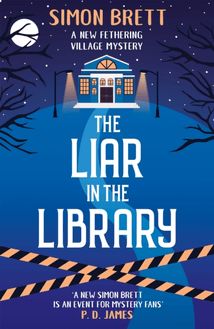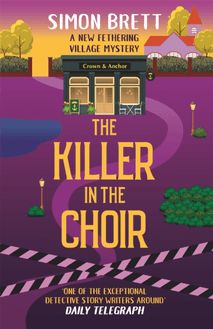Murder in the Museum , livre ebook
184
pages
English
Ebooks
2019
Vous pourrez modifier la taille du texte de cet ouvrage
Obtenez un accès à la bibliothèque pour le consulter en ligne En savoir plus
Découvre YouScribe en t'inscrivant gratuitement
Découvre YouScribe en t'inscrivant gratuitement
184
pages
English
Ebooks
2019
Vous pourrez modifier la taille du texte de cet ouvrage
Obtenez un accès à la bibliothèque pour le consulter en ligne En savoir plus
Publié par
Date de parution
06 juin 2019
Nombre de lectures
0
EAN13
9781786897886
Langue
English
Publié par
Date de parution
06 juin 2019
Nombre de lectures
0
EAN13
9781786897886
Langue
English
Simon Brett worked as a producer in radio and television before taking up writing full-time. He was awarded an OBE in the 2016 New Year’s Honours ‘for services to literature’ and also was elected a Fellow of the Royal Society of Literature. In 2014 he won the CWA’s prestigious Diamond Dagger for an outstanding body of work. simonbrett.com
Also by Simon Brett
The Fethering Mysteries The Body on the Beach Death on the Downs The Torso in the Town The Hanging in the Hotel The Witness at the Wedding The Stabbing in the Stables Death Under the Dryer Blood at the Bookies The Poisoning in the Pub The Shooting in the Shop Bones Under the Beach Hut Guns in the Gallery Corpse on the Court The Strangling on the Stage The Tomb in Turkey The Killing in the Cafe The Liar in The Library
The Charles Paris Theatrical Series Dead Room Farce A Decent Interval The Cinderella Killer
The Mrs Pargeter Mysteries Mrs Pargeter’s Point of Honour Mrs Pargeter’s Principle Mrs Pargeter’s Public Relations
First published in Great Britain, the USA and Canada in 2019 by Black Thorn, an imprint of Canongate Books Ltd, 14 High Street, Edinburgh EH1 1TE
This digital edition first published in 2019 by Black Thorn, an imprint of Canongate Books
First published in 2003 by Macmillan Publishers Ltd, Pan Macmillan, 20 New Wharf Road, London N1 9RR
blackthornbooks.com
Copyright © Simon Brett, 2003
The moral right of the author has been asserted
This is a work of fiction. Names, characters, places and incidentsare either the product of the author’s imagination or are used fictitiously. Except where actual historical events and characters are being described for the storyline of this novel, all situations in this publication are fictitious and any resemblance to actual persons, living or dead, business establishments, events or locales is purely coincidental
British Library Cataloguing-in-Publication Data A catalogue record for this book is available on request from the British Library
eISBN 978 1 78689 788 6
Contents
Chapter One
Chapter Two
Chapter Three
Chapter Four
Chapter Five
Chapter Six
Chapter Seven
Chapter Eight
Chapter Nine
Chapter Ten
Chapter Eleven
Chapter Twelve
Chapter Thirteen
Chapter Fourteen
Chapter Fifteen
Chapter Sixteen
Chapter Seventeen
Chapter Eighteen
Chapter Nineteen
Chapter Twenty
Chapter Twenty-One
Chapter Twenty-Two
Chapter Twenty-Three
Chapter Twenty-Four
Chapter Twenty-Five
Chapter Twenty-Six
Chapter Twenty-Seven
Chapter Twenty-Eight
Chapter Twenty-Nine
Chapter Thirty
Chapter Thirty-One
Chapter Thirty-Two
Chapter Thirty-Three
Chapter Thirty-Four
Chapter Thirty-Five
Chapter Thirty-Six
Chapter Thirty-Seven
Chapter Thirty-Eight
Chapter Thirty-Nine
Chapter Forty
Chapter Forty-One
Chapter Forty-Two
Chapter Forty-Three
Chapter Forty-Four
To Norman and Hilary
Chapter One
Carole Seddon was good at meetings, but only when she was running them. She got restless under the chairmanship of others, particularly those she didn’t think were very impressive chairmen.
And Lord Beniston fitted firmly into that category. Carole’s years in the Home Office had been, amongst many other things, a consumer guide in the conduct of meetings. While honing her own style of calm efficiency, she had endured the chairmanship of the overanxious, the under-prepared, the nit-picking, the lethargic and the frankly incompetent. But Lord Beniston brought a new shortcoming to the role – a world-weary patrician arrogance, which suggested that the afternoon’s agenda was a tiresome interruption to his life and that the Trustees of Bracketts were extremely privileged to have him present amongst them. They might represent the Great and the Good of West Sussex, but he represented the Great and the Good on a national scale. Their names might look quite good on a charity’s letterhead, but Lord Beniston was confident that his name looked a lot better (even though the reforms of New Labour no longer allowed him a seat in the House of Lords).
He was in his sixties, with steel-grey hair whose parallel furrows always looked as if it had just been combed. He had a claret-coloured face, and yellowish teeth which looked permanently clenched, though his manner was too arrogant to be tense. Presumably there were times when he didn’t wear a pin-striped suit and a blue and red regimental tie, but none of the Bracketts Trustees had ever seen him out of that uniform.
The Bracketts Trust met six times a year, and this was Carole’s second appearance. She had accepted the offer of a Trusteeship with some misgivings, and the first meeting had strengthened these to the extent that now, only halfway through her second, she was already assessing graceful ways of shedding the responsibility she had taken on.
She didn’t get the feeling she’d be much missed. The offer to join the Bracketts Board had come from the venue’s new Director, Gina Locke, and seemed to have been issued in the mistaken belief that Carole’s background as a civil servant might provide some shortcuts through the tangles of government bureaucracy, and also that she might have wealthy contacts who would prove useful in the eternal business of fund-raising. When, at the first meeting it had become clear that their new recruit was unlikely to fulfil either of these needs, the other Trustees seemed to lose interest in her.
And Carole Seddon’s own interest in the affairs of Bracketts was finite. The house was a literary shrine, and she couldn’t really claim to be a literary person. Her reasons for accepting the Trusteeship had been a surprise at being asked, a sense of being flattered, and a feeling that she ought to make more of an effort to fill her years of retirement. Well-pensioned, comfortably housed in High Tor, a desirably neat property in the West Sussex seaside village of Fethering, Carole Seddon did have time on her hands. A thin woman in her early fifties, with short grey hair and glasses shielding pale blue eyes, she reckoned her brain was as good as it ever had been, and deserved more exercise than the mental aerobics of the Times crossword. But she wasn’t convinced that listening to the bored pontifications of Lord Beniston was the kind of workout it needed.
The setting was nice, though, hard to fault that. The Trustees’ Meetings always took place in the panelled dining room of Bracketts, and were held on Thursdays at five, after the house and gardens had ceased to admit visitors. This was the last meeting of the season; at the end of the next week, coinciding with the end of October, the site would be closed to the public until the following Easter.
Bracketts, set a little outside the Downland village of South Stapley, was one of those houses which had grown organically. The oldest part was Elizabethan, and additions had been made in Georgian and Victorian times.
Through the diamond-paned leaded windows, Carole Seddon could see over the house’s rolling lawns to the gleam of the fast-flowing River Fether which ran out into the sea some fifteen miles away at Fethering. It was late autumn, when the fragile heat of the day gave way at evening to the cold breath of approaching winter, but perhaps one of the best times of year to appreciate the beauty and seclusion of the estate. Bracketts was an idyllic place to be the home of a writer.
The writer to whom the shrine was dedicated was Esmond Chadleigh. His father Felix had bought Bracketts during the First World War, getting the property cheap, in a state of considerable dilapidation, and spending a great deal on loving restoration of the house and gardens. When Felix Chadleigh died in 1937, Bracketts was left to his son and, funded by family inheritance and his own writing income, Esmond Chadleigh had lived there in considerable style until his own death in 1967.
Esmond Chadleigh was one of those Catholic figures, like Chesterton and Belloc, who, in that unreal, unrealistic world of England between the wars, had made his mark in almost every department of the world of letters. Adult novelist, children’s story-teller, light versifier, essayist, critic, it seemed there was no form of writing to which Esmond Chadleigh could not turn his hand. But when the derisory adjective ‘glib’ was about to be applied to him, critics were brought up short by a series of deeply felt poems of suffering, published in 1935 under the title Vases of Dead Flowers . Of these, the most famous, a staple of anthologies, school assemblies, memorial services and Radio Four’s With Great Pleasure selections, was the poem ‘Threnody for the Lost’.
Written, according to Esmond Chadleigh’s Introduction, nearly twenty years before its first publication, this was a lament for his older brother Graham, who at eighteen had set off for the battlefields of Flanders and never returned, even in a coffin. In the room where the Trustees were meeting was a glass-topped display-case, dedicated to the memory of Graham Chadleigh.
The space was divided down the middle. On one side there were photographs of him as a boy in a house before Bracketts, with his younger brother beside him; both carried tennis rackets. Then Graham appeared in a cricket team in a gravely posed school photograph, dated 1915. Besides this was the faded tasselled cap of his cricket colours. There was a letter he had written from school to his parents, politely requesting them to send him more tuck.
On the other side of the division was the pitifully small collection of memorabilia from Graham Chadleigh’s wartime life. There was a letter written to him in the trenches by his father. There was a cap-badge and a service revolver. That was all that had been recovered.
It was the totality of his absence that could still shock visitors to Bracketts at the beginning of the twenty-first century. Like many others in the muddy holocaust of Passchendaele, Graham Chadleigh had just vanished off the face of the earth, literal







